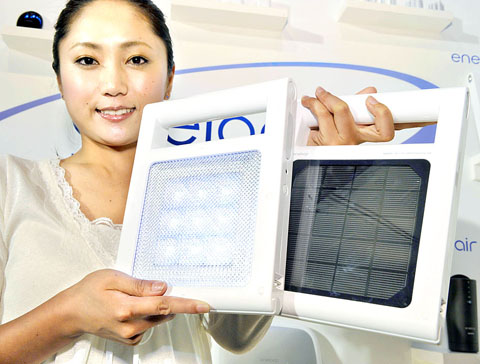The world must speed up the deployment of solar power as it has the potential to meet all the world’s energy needs, the chairman of an industry gathering that wrapped up on Friday in Spain said.
“The solar energy resource is enormous, and distributed all over the world, in all countries and also oceans,” said Daniel Lincot, the chairman of the five-day European Photovoltaic Solar Energy conference held in Valencia.
“There is thus an enormous resource available from photovoltaics, which can be used everywhere, and can in principle cover all the world energy demand from a renewable, safe and clean source,” Lincot said.

PHOTO: AFP
Lincot, the research director of the Paris-based Institute for Research and Development of Photovoltaic Energy, said solar energy was growing rapidly but still made only a “negligible” contribution to total energy supply.
Last year the world production of photovoltaic models represented a surface of 40km², while meeting the electrical consumption of countries like France or Germany would require 5,000km², he said.
Under current scenarios, photovoltaic models will represent about 1,000km² by 2020, accounting for only about 3 percent of energy needs in the 27-member EU, he said.
More than 200 scientists and solar power experts have signed a declaration calling for the accelerated deployment of photovoltaic power that was launched at the conference.
More than 3,500 experts and 715 sector firms took part in the gathering, billed as the largest conference ever organized in the field of photovoltaic conversion of solar energy.
Germany and Spain are the world leaders in solar energy power.
Germany has 4,000 megawatts of installed capacity, while Spain has 600 megawatts.

WEAKER ACTIVITY: The sharpest deterioration was seen in the electronics and optical components sector, with the production index falling 13.2 points to 44.5 Taiwan’s manufacturing sector last month contracted for a second consecutive month, with the purchasing managers’ index (PMI) slipping to 48, reflecting ongoing caution over trade uncertainties, the Chung-Hua Institution for Economic Research (CIER, 中華經濟研究院) said yesterday. The decline reflects growing caution among companies amid uncertainty surrounding US tariffs, semiconductor duties and automotive import levies, and it is also likely linked to fading front-loading activity, CIER president Lien Hsien-ming (連賢明) said. “Some clients have started shifting orders to Southeast Asian countries where tariff regimes are already clear,” Lien told a news conference. Firms across the supply chain are also lowering stock levels to mitigate

Six Taiwanese companies, including contract chipmaker Taiwan Semiconductor Manufacturing Co (TSMC, 台積電), made the 2025 Fortune Global 500 list of the world’s largest firms by revenue. In a report published by New York-based Fortune magazine on Tuesday, Hon Hai Precision Industry Co (鴻海精密), also known as Foxconn Technology Group (富士康科技集團), ranked highest among Taiwanese firms, placing 28th with revenue of US$213.69 billion. Up 60 spots from last year, TSMC rose to No. 126 with US$90.16 billion in revenue, followed by Quanta Computer Inc (廣達) at 348th, Pegatron Corp (和碩) at 461st, CPC Corp, Taiwan (台灣中油) at 494th and Wistron Corp (緯創) at

NEW PRODUCTS: MediaTek plans to roll out new products this quarter, including a flagship mobile phone chip and a GB10 chip that it is codeveloping with Nvidia Corp MediaTek Inc (聯發科) yesterday projected that revenue this quarter would dip by 7 to 13 percent to between NT$130.1 billion and NT$140 billion (US$4.38 billion and US$4.71 billion), compared with NT$150.37 billion last quarter, which it attributed to subdued front-loading demand and unfavorable foreign exchange rates. The Hsinchu-based chip designer said that the forecast factored in the negative effects of an estimated 6 percent appreciation of the New Taiwan dollar against the greenback. “As some demand has been pulled into the first half of the year and resulted in a different quarterly pattern, we expect the third quarter revenue to decline sequentially,”

ASE Technology Holding Co (ASE, 日月光投控), the world’s biggest chip assembly and testing service provider, yesterday said it would boost equipment capital expenditure by up to 16 percent for this year to cope with strong customer demand for artificial intelligence (AI) applications. Aside from AI, a growing demand for semiconductors used in the automotive and industrial sectors is to drive ASE’s capacity next year, the Kaohsiung-based company said. “We do see the disparity between AI and other general sectors, and that pretty much aligns the scenario in the first half of this year,” ASE chief operating officer Tien Wu (吳田玉) told an